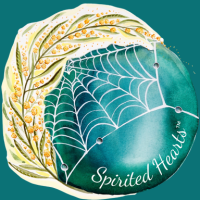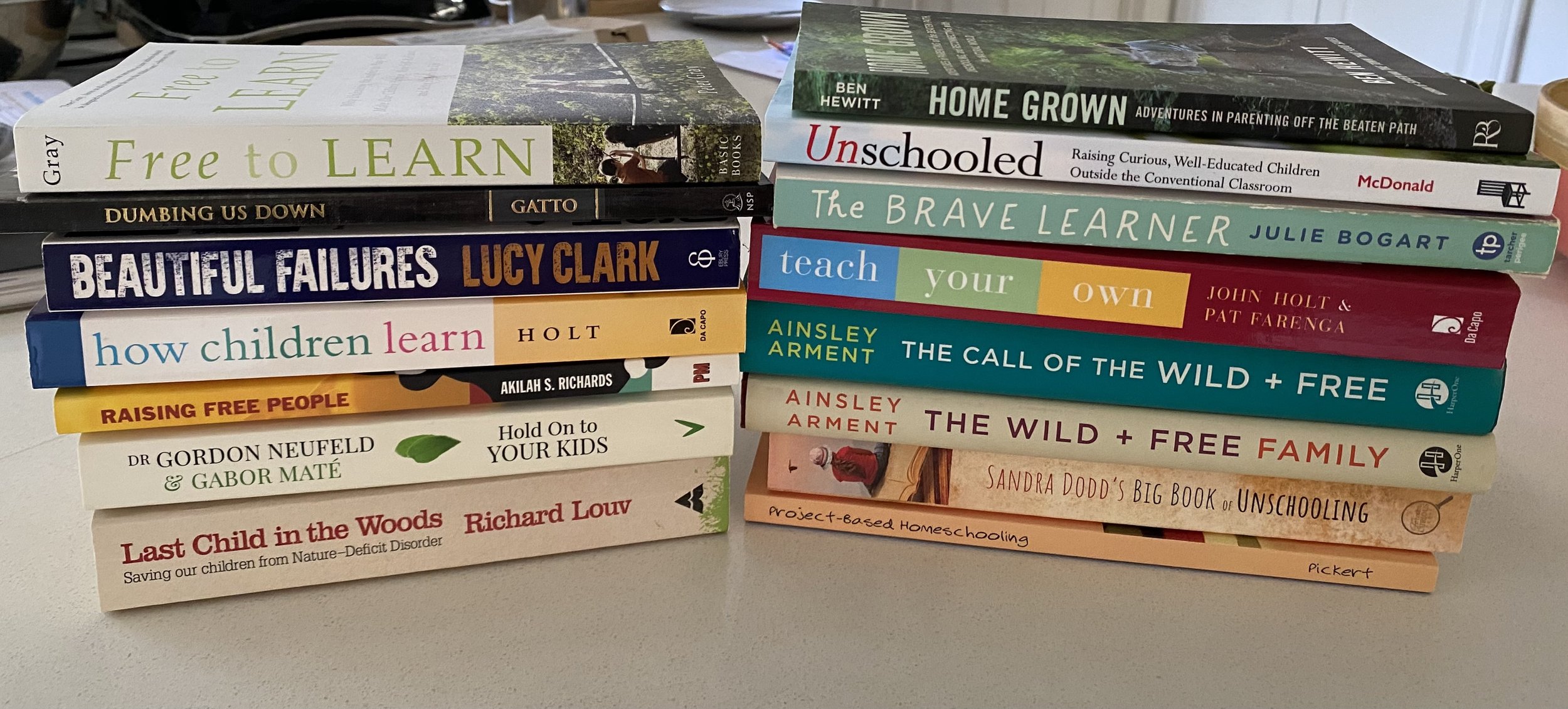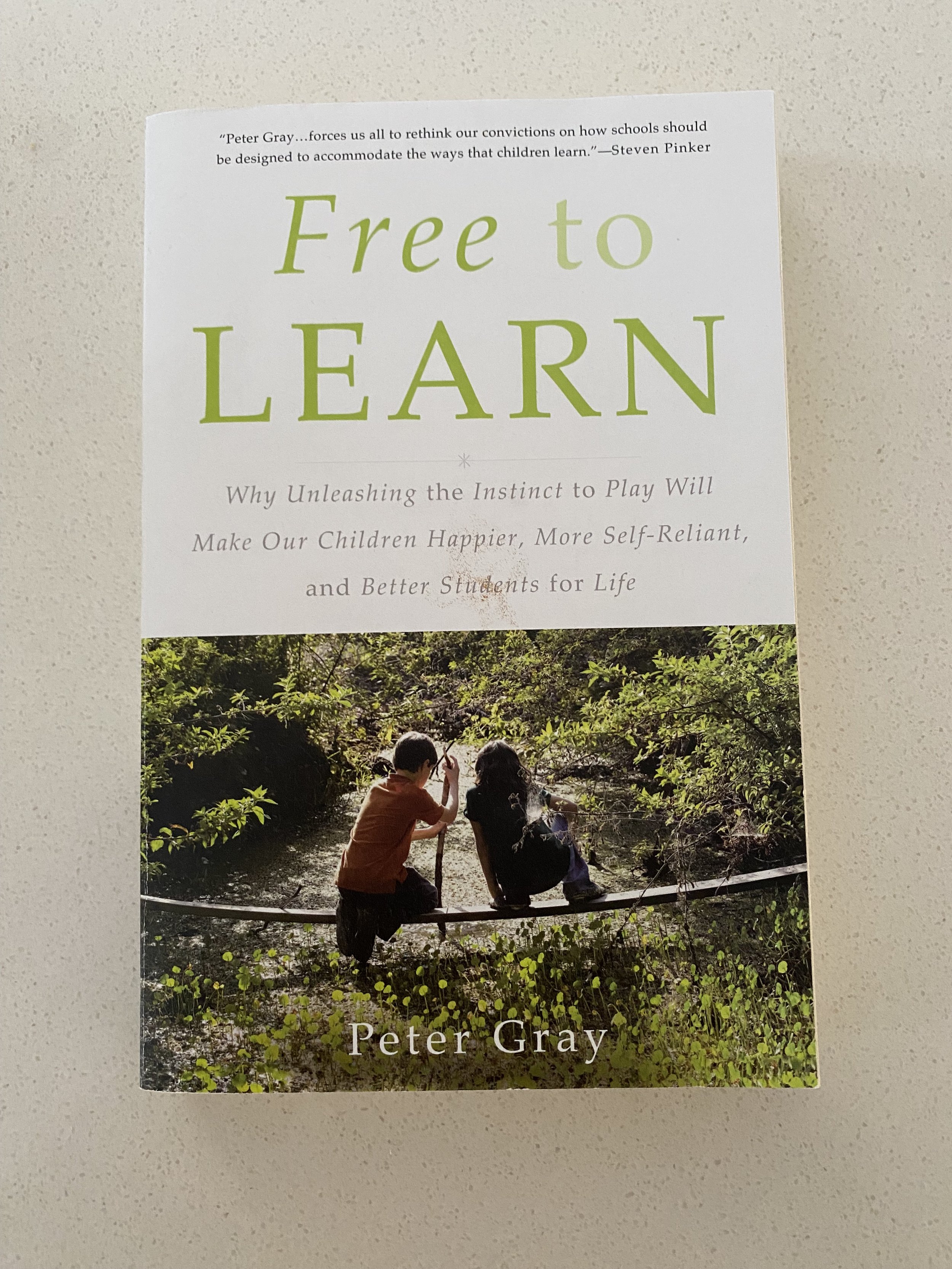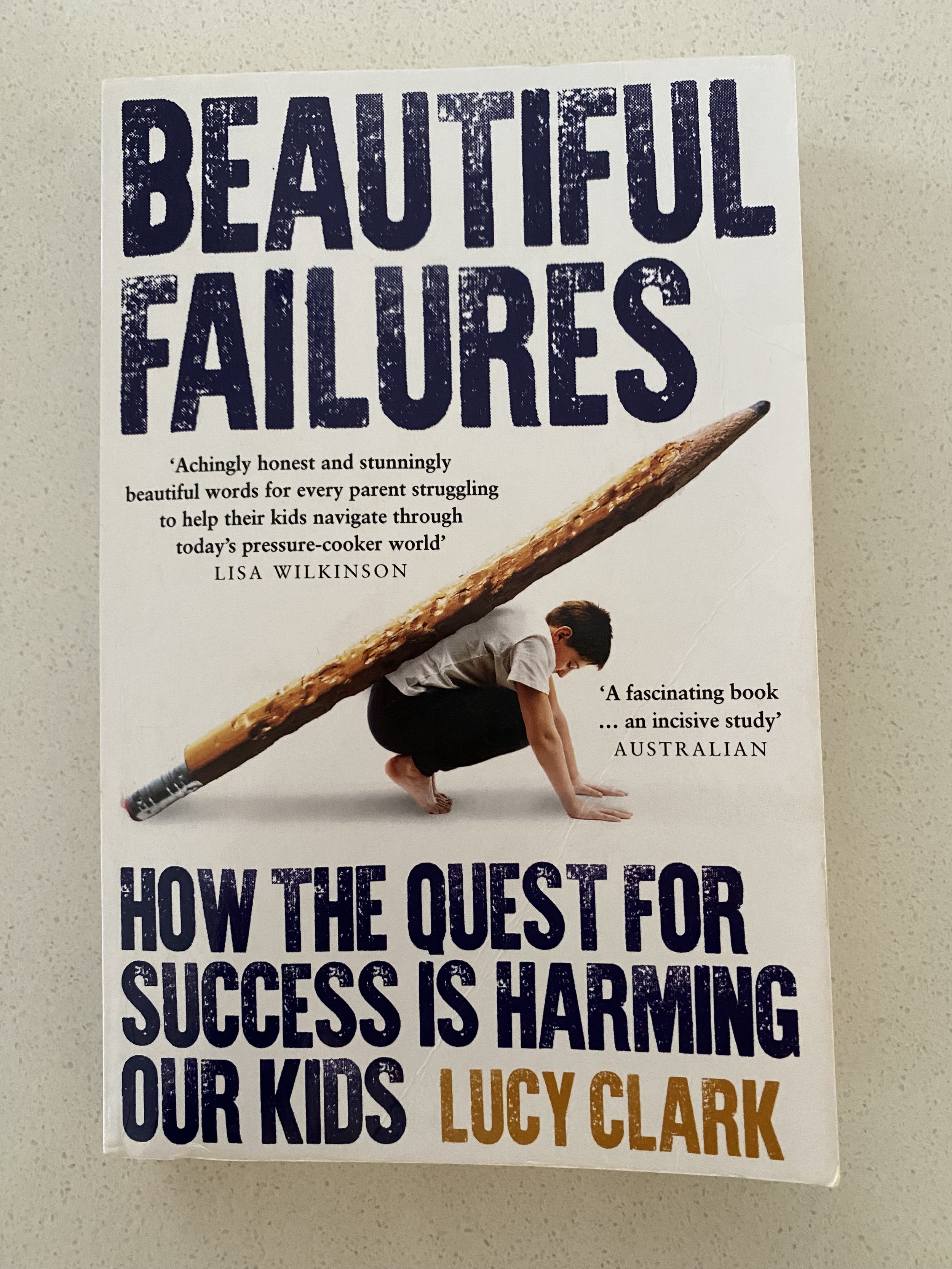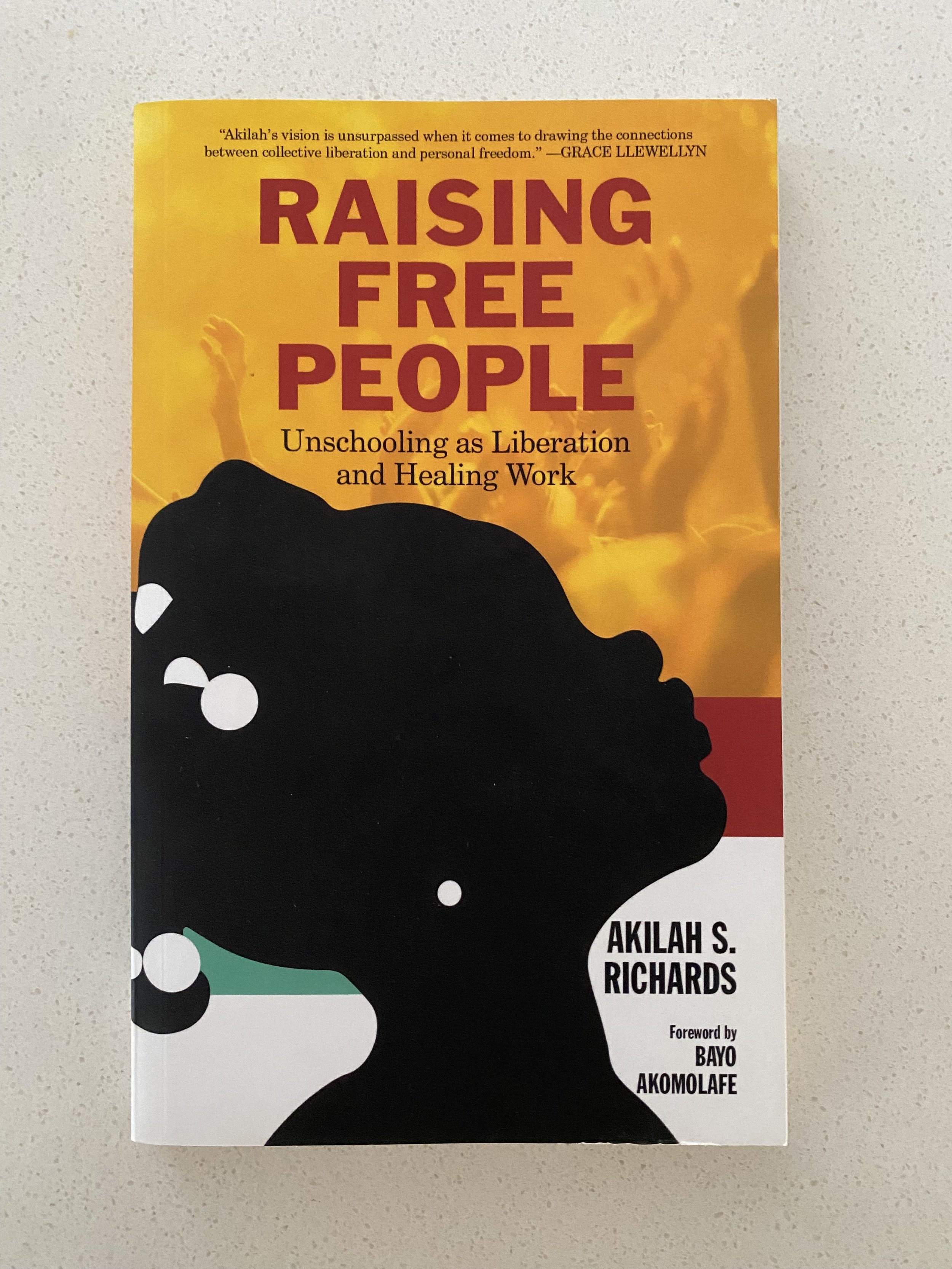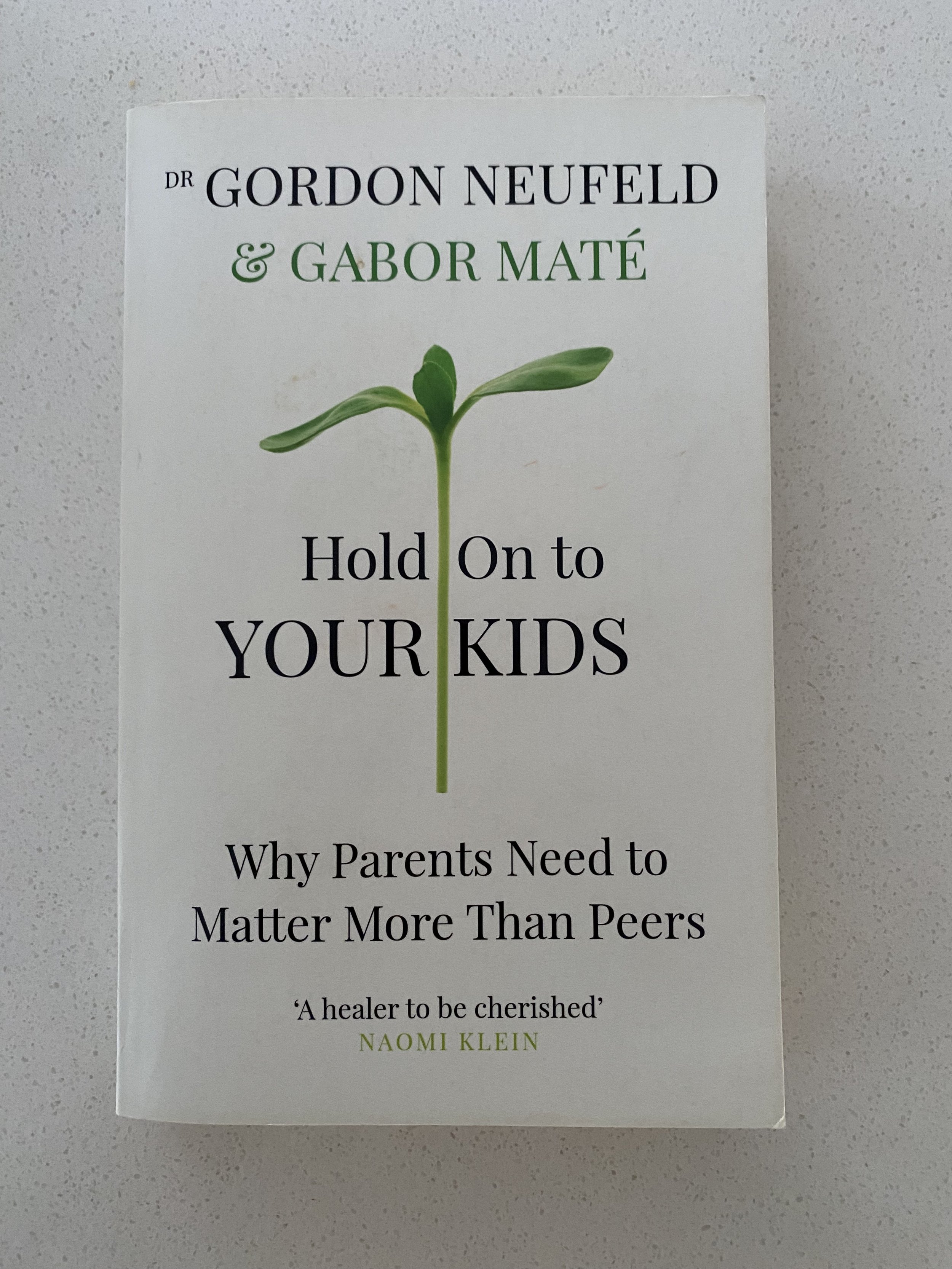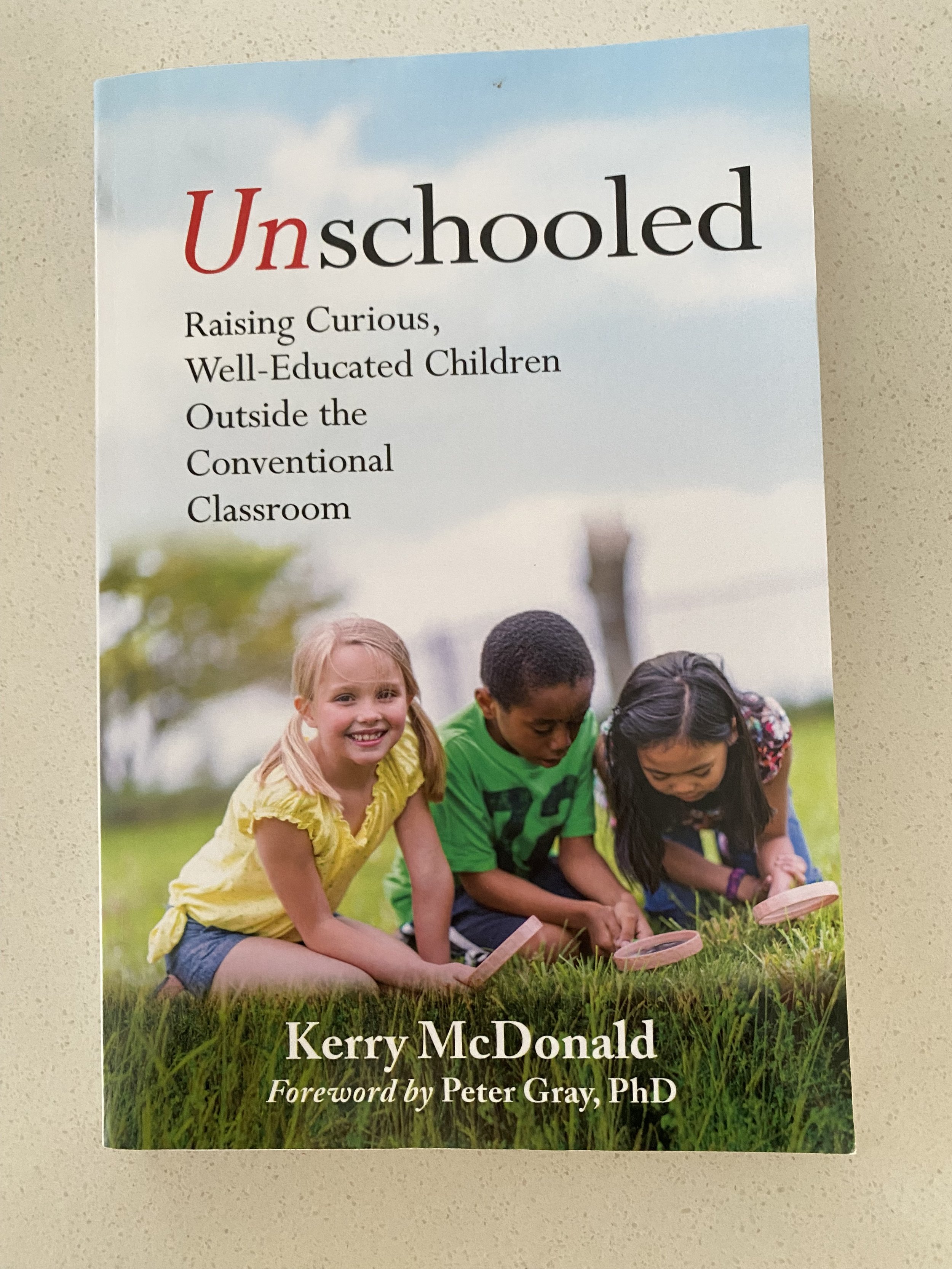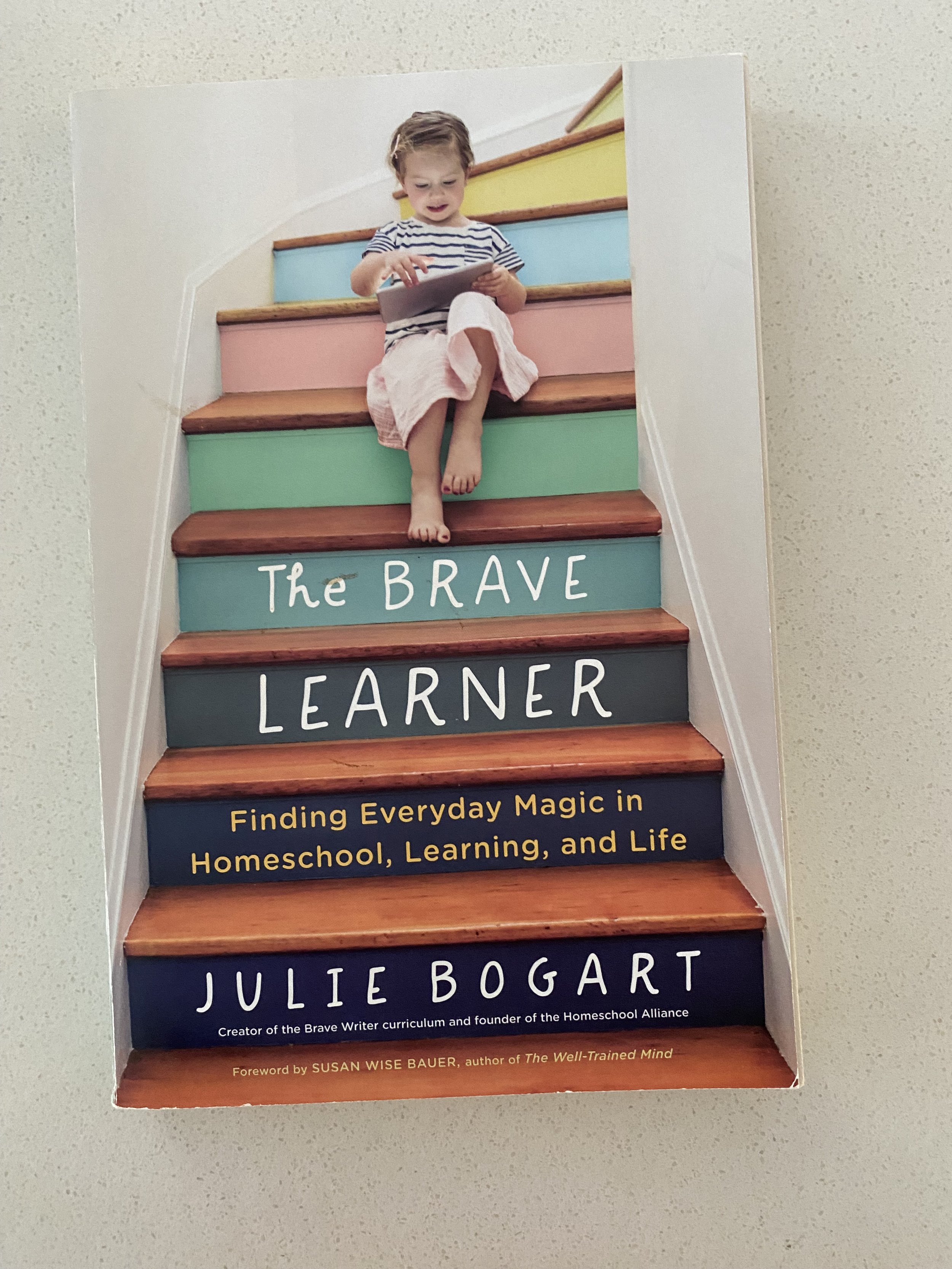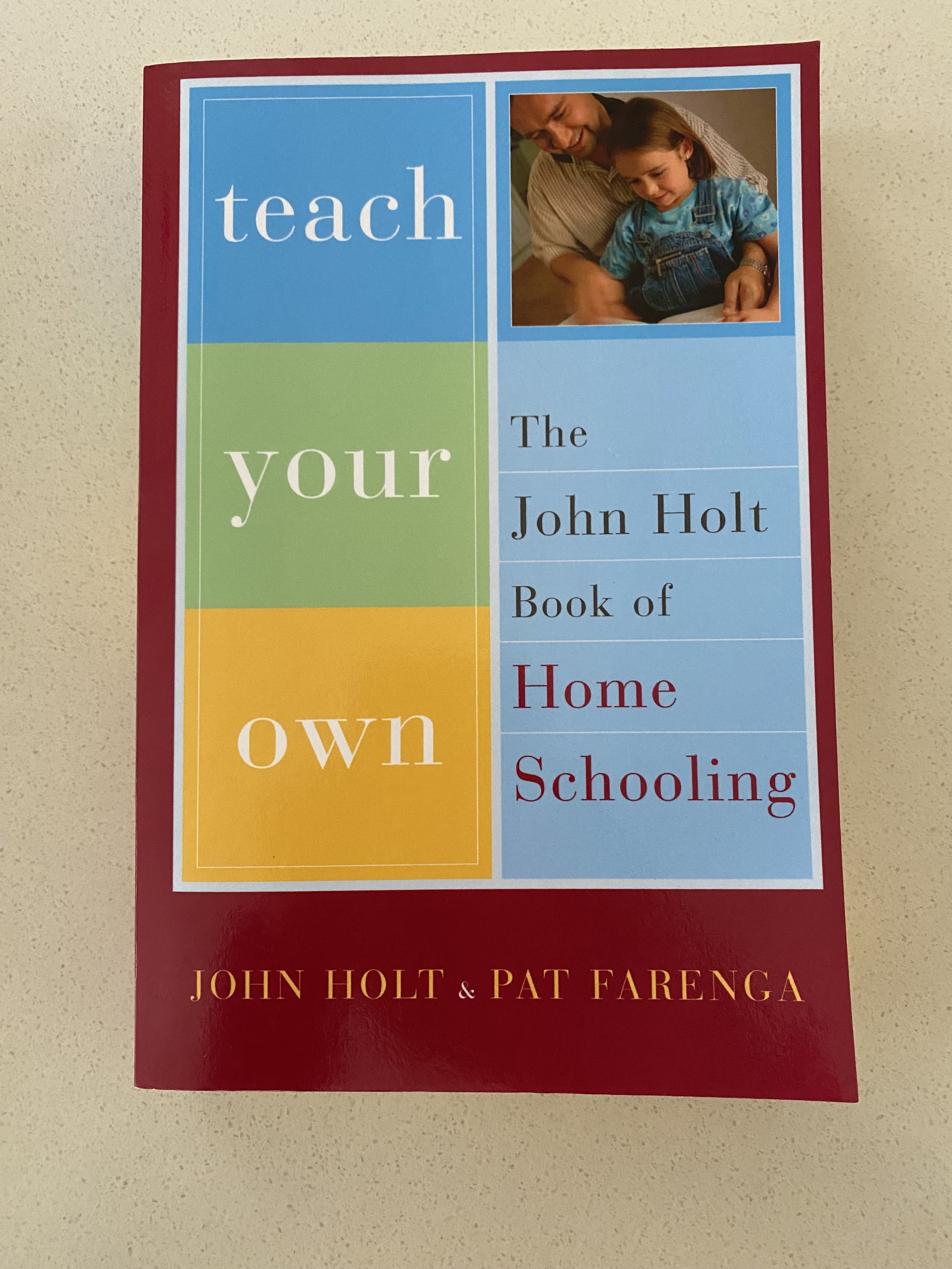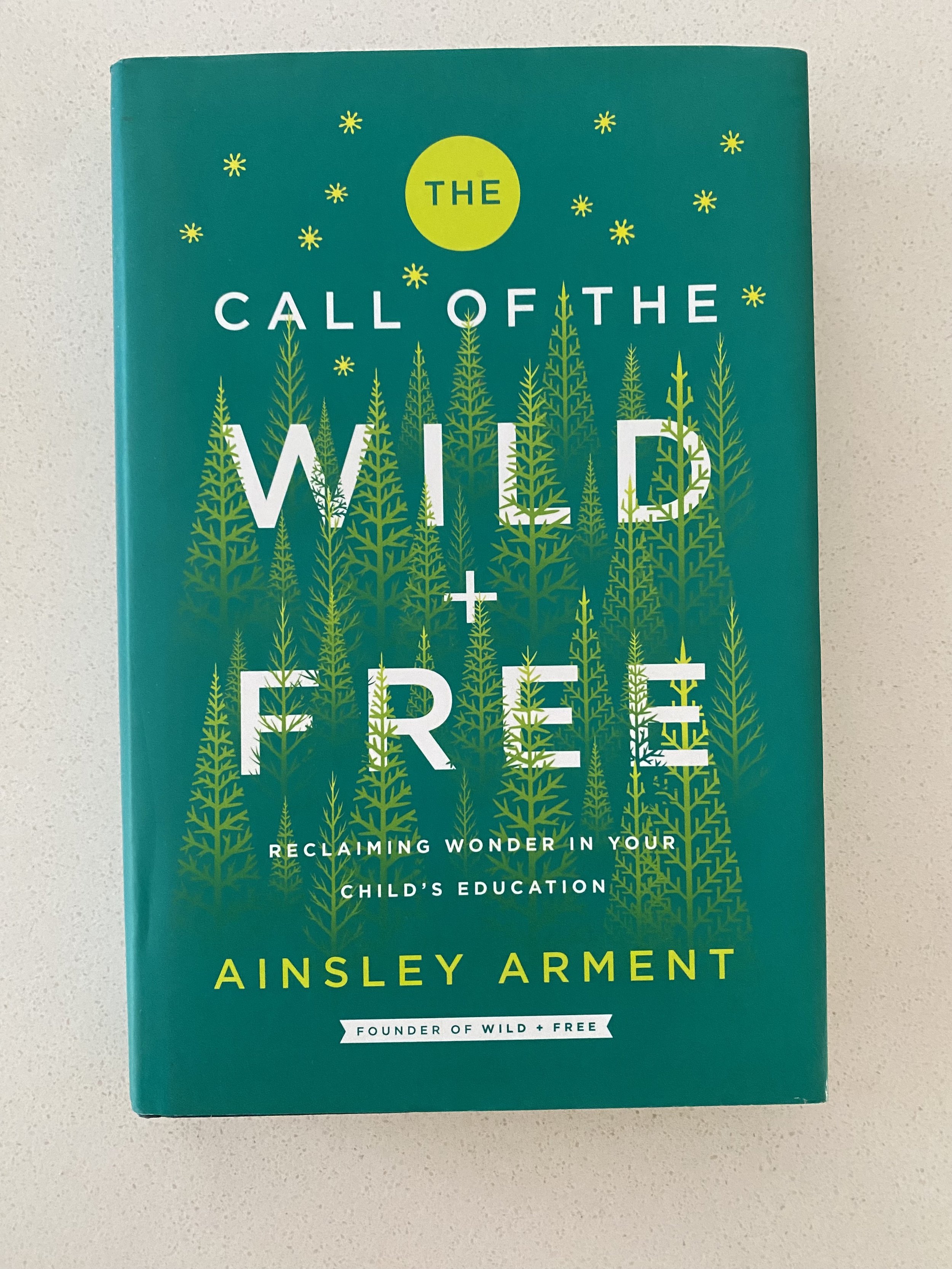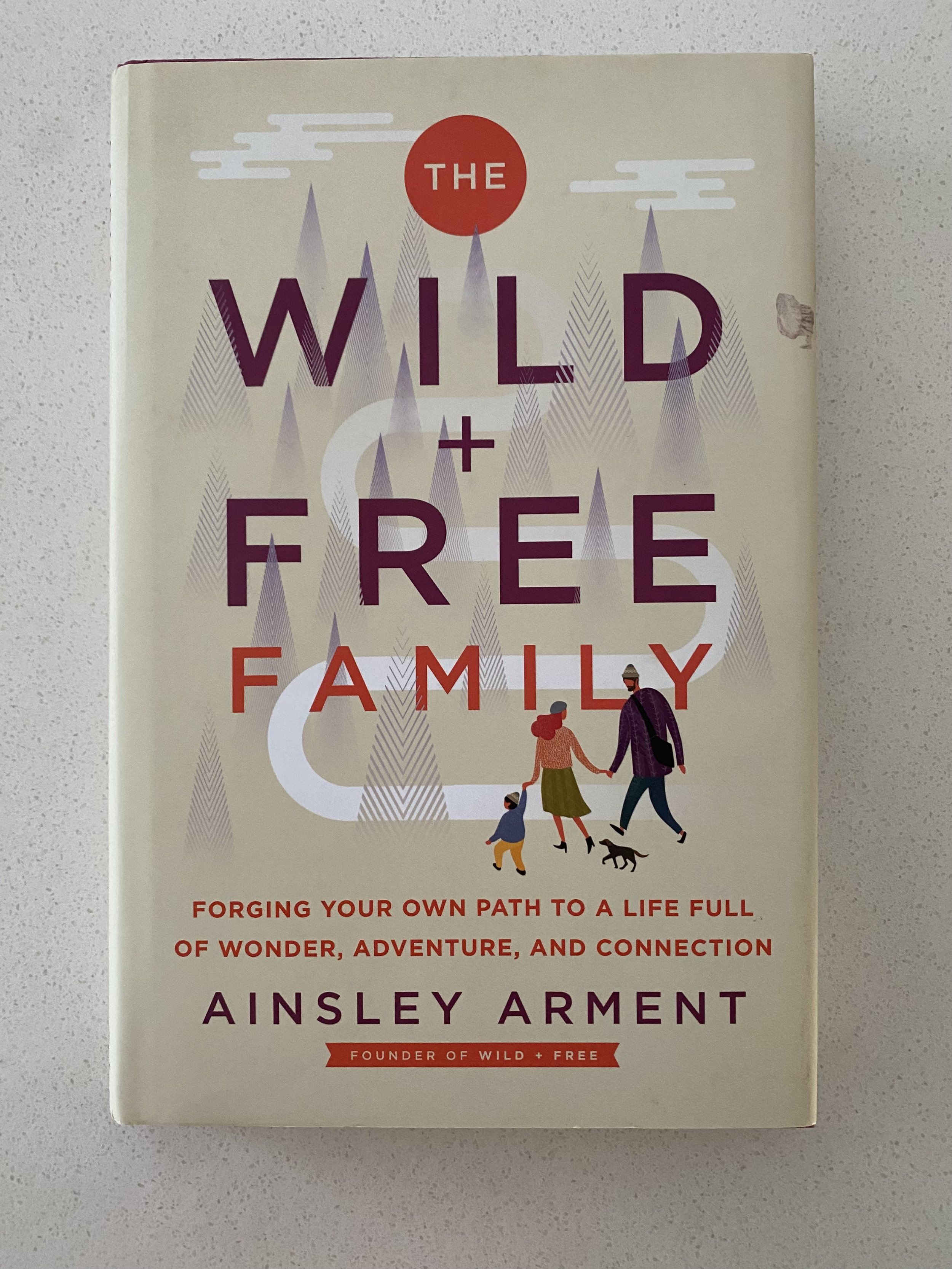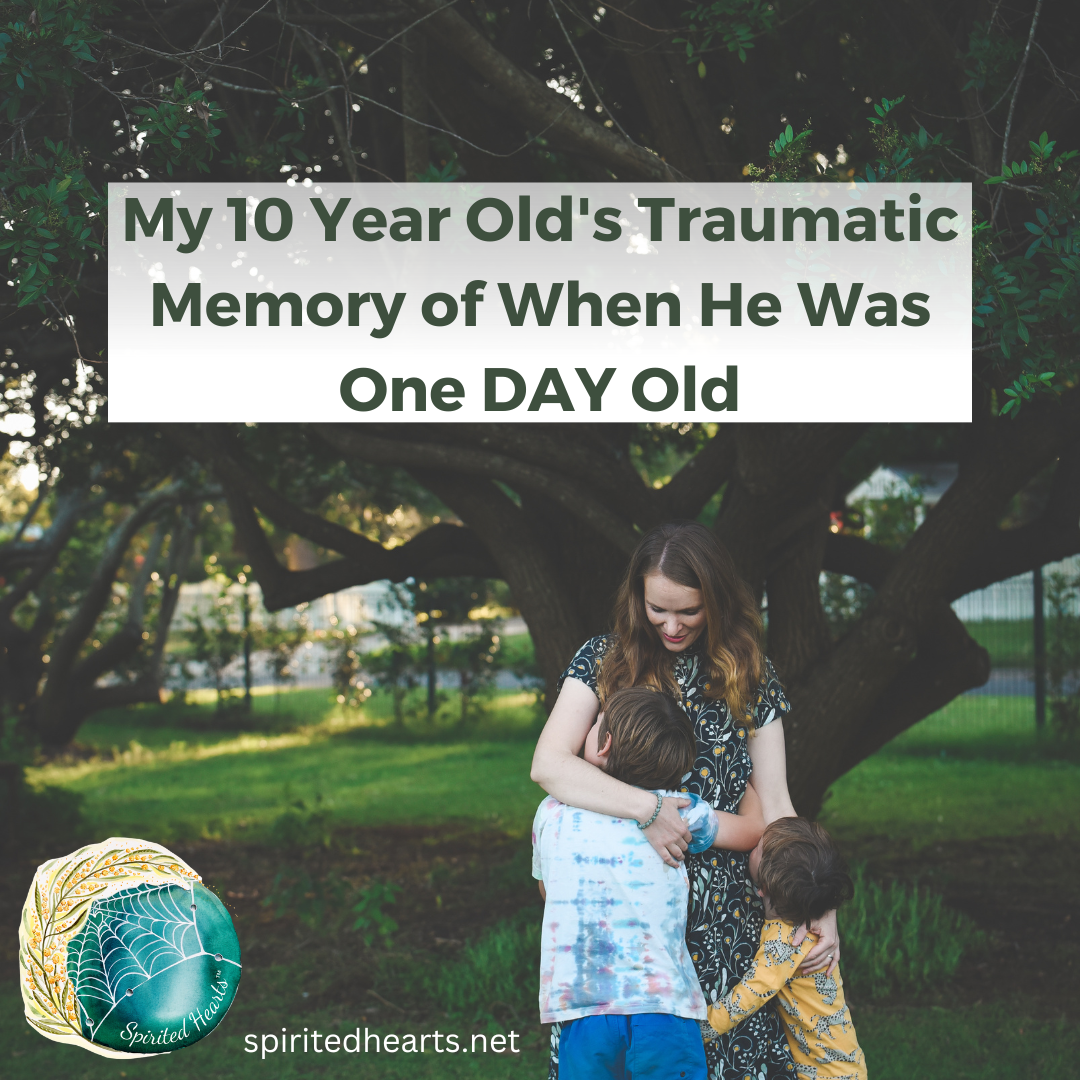"I Don't Like The Word Learning."
A few weeks ago my 10 year old declared "I don't like the word learning."
"What's a word you would prefer to use instead?"
He sat for a moment in contemplation.
"Discover. I would use the word discover instead of learning or education. To discover something is exciting, and something you choose, not something you are told you have to do."
This is the kind of magic that happens when you trust your child, when you give them space to express themselves authentically, and when you give yourself permission to live a life of endless possibilities.
A few weeks ago my 10 year old declared "I don't like the word learning."
"What's a word you would prefer to use instead?"
He sat for a moment in contemplation.
"Discover.
I would use the word discover instead of learning or education. To discover something is exciting, and something you choose, not something you are told you have to do."
This is the kind of magic that happens when you trust your child, when you give them space to express themselves authentically, and when you give yourself permission to live a life of endless possibilities.
Let's look at some definitions (Cambridge dictionary):
Education - the process of teaching or learning, especially in a school or college, or the knowledge that you get from this
Learning - knowledge or skill acquired by instruction or study
Discovery - the process of finding information, a place, or and object, especially for the first time
If you look at the first 2 definitions, they have something in common: that some form of external factor is involved.
Learning is something that does occur naturally, however, it is so entrenched in outcomes thanks to the education system, that the process doesn't seem to matter anymore, as long as the results are there. Numerous studies have proven that memorising and regurgitating facts (i.e. rote learning) has no determination on what the student learns. Children are merely demonstrating their memory recall skills (don't believe me, listen to episode 53 and 35 of the podcast)
When I see the word discover, I feel freedom, joy, aliveness, curiosity, and a deep sense of intrinsic interest and motivation.
In a study conducted in the 1960s requested by NASA, researchers discovered that school children lose their natural ability to think creatively the more time they spend within the school system:
98% of 5-year-olds tested at the “genius” level
They tested the same children at 10 years old, the percentage of genius-level imaginative and innovative thinkers fell to 30%.
At age 15 the genius-level of the same students had dropped to 12%
Only 2% of adults still retain their ability to think imaginatively, with creativity and innovation
Their conclusion: the education system is responsible for dumbing down humanity.
If this is something that interests you I highly recommend Free to Learn by Dr Peter Gray and Dumbing Us Down by John David Gatto (read more about their books here)
When my son told me he prefers the word DISCOVER, I listened, I reflected and I realised how far we are yet to come as a society.
When we think about it, discover is exactly what we do. Once we discover something, we move on to the next discovery, or we dig deeper to discover more about a particular interest.
Life is fluid, flexible, adaptable, possible.
It is not something that should be rigid, structured, outlined or riddled with outcomes.
To do that, is to deprive ourselves of embodying the very creative beings that we are.
What a cruel disservice are we subjecting our children and ourselves to when we educate and force them to learn what is dictated to them by the education system.
Let's discover life, the way we were born to.
This is permission to live life the way you want to live it.
If you don't like a particular word, don't use it.
If your child wants to create entirely new words, let them.
Just because something is labelled as a 'norm' does not make it right.
Normal is not a reflection of who a person is, or the potential of what they are yet to become, in their own time and in their own way.
I choose to live a life of discovery, authenticity and adventure.
That involves shutting doors, going against the flow, rocking boats and saying 'no' to many societal norms.
It's not a well-trodden path.
But then again the best paths in life are the ones yet to be discovered.
Spirited Hearts® Most Recommended Books for Homeschooling
I often get asked “how do you do it?” “what if I have all of these fears?” and “what if I mess up my child’s education?”
These are all valid questions, that can leave parents feeling overwhelmed, terrified and stressed.
On my journey through life learning (the term I used to describe our type of homeschooling), I have found invaluable wisdom and knowledge in the books listed below.
I often get asked “how do you do it?” “what if I have all of these fears?” and “what if I mess up my child’s education?”
These are all valid questions, that can leave parents feeling overwhelmed, terrified and stressed.
On my journey through life learning (the term I used to describe our type of homeschooling), I have found invaluable wisdom and knowledge in the books listed below.
Whether you are already homeschooling, desiring to homeschool or the idea hasn’t even crossed your mind, all of these books can help you on your journey.
Free to Learn: Why Unleashing the Instinct to Play Will Make Our Children Happier, More Self-Reliant, and Better Students for Life by Peter Gray
This is the one of the most recommended books by guests on the Spirited Hearts podcast, and a book I also highly recommend. This book explores the history of the education system, the harm it causes to our children and ways we can improve our children’s lives through meaningful, self-directed learning. This book is the perfect starting point of you are considering homeschooling. You can listen to Dr Peter Gray speak on the Spirited Hearts podcast.
Dumbing Is Down: The Hidden Curriculum of Compulsory Schooling by John Taylor Gatto
After being a teacher for 30 years, John became an advocate for families and children, taking back education and learning. He shares his experiences on the detrimental effects of formal schooling and why children need less school, not more. If you are hesitant about homeschooling, this book offers insight into how the education system works. When we understand the broken system, we can use that to inform our decisions for the future of our children.
Beautiful Failures: How the Quest for Success is Harming Our Kids by Lucy Clark
This is such a brilliant book outlining how schooling causes anxiety and depression in children today based on the unnecessary academic pressure they experience from the education system. This book challenges all the ‘norms’ of school and holds the education system to accountability for its role in the declining wellbeing of children’s mental and emotional health. If your child is at school and you don’t have the capacity to homeschool, this book can bring more awareness so you can advocate for your child at school.
How Children Learn by John Holt
This book was first published in 1967 and my gosh was John Holt WAY ahead of his time. This was a man who was not only aware, but challenged the way the education system claims children learn. When you understand learning and how it happens, you realise that children don’t need school at all.
Raising Free People: Unschooling as Liberation and Healing Work by Alisha S. Richards
The author argues why we need to build and work within systems truly designed for humans to learn, grow, socialise and thrive. Unschooling has been proven to heal generations of school trauma. This book also explores examples of transitioning from school or homeschooling to unschooling.
Hold on to Your Kids: Why Parents Need to Matter More Than Peers by Dr Gordon Neufeld and Dr Gabor Mate
This is also a frequently recommended book by guests on the podcast. The authors argue that for many children today, peers have replaced parents. This means that rather than taking values from their family, their identities are being shaped by their classmates, which is not natural and can be dangerous - think peer pressure and drugs as a worst case scenario. This book also offers practical advice on how to reconnect with our children and form lifelong secure attachments. A very insightful book whether you homeschool, and especially if your child attends school.
Last Child in the Woods: Saving Our Children from Nature-Deficit Disorder by Richard Louv
Especially when children attend school and extracurricular activities, they are more at risk of health issues due to no nature connection. We are a part of nature, we need a connection to the natural world to thrive and when we spend most of our lives in classrooms, offices, workshops and inside houses, we decrease our overall well-being. This is a must read for every single family!
Home Grown: Adventures in Parenting off the Beaten Path, Unschooling, and Reconnecting with the Natural World by Ben Hewitt
This is a beautiful personal account of one family’s unschooling journey in the woods. It challenges most of our cultures faulty thinking about education, and demonstrates the strengths that comes from learning through living life. My husband really enjoyed this book too!
Unschooled: Raising Curious, Well-Educated Children Outside the Conventional Classroom by Kerry McDonald
This is a well-researched and helpful companion to have on your unschooling journey. It addresses what unschooling is, why our childhood isn’t what it used to be, and how we can beat support our children whether they are learning at home or go to school.
The Brave Learner: Finding Everyday Magic in Homeschool, Learning and Life by Julie Bogart
This book is all about making learning exciting and enchanting for your child/ren. It provides practical guidance on supporting your child in all areas of learning and invites you to model learning with curiosity, courage and joy.
Teach Your Own: The John Holt Book of Home Schooling by John Holt and Pat Farenga
This book is an in-depth exploration of what homeschooling can look like, and why learning at home doesn’t need to mirror school. Some of the topics explored include learning without teaching, learning difficulties, how to get started, learning in the world, plus so much more.
The Call of the Wild + Free: Reclaiming Wonder in Your Child’s Education by Ainsley Arment
This is a delightful read and is very helpful on your homeschooling journey. This book addresses many of the myths of homeschooling, finding your own unique rhythm and saving childhood for our children by providing them with meaningful, adventurous and magical learning experiences.
The Wild + Free Family: Forging Your Own Path to a Life Full of Wonder, Adventure and Connection by Ainsley Arment
I loved this book and how it addresses another beautiful aspect of homeschooling, and that’s family. When you homeschool, it isn’t just about your child’s learning journey. It’s about creating the family culture you are all needing, connecting with your children, creating a safe haven and adventuring through life and learning together.
Sandra Dodd’s Big Book of Unschooling
This is an insightful summary of Sandra’s website and her decades experience in unschooling her own children. It is layer out in a very accessible manner, with so much information ranging from toddlers, all the way to teenagers and beyond.
Project-Based Homeschooling: Mentoring Self-Directed Learners by Lori Pickett
This book is a collection of strategies for helping children direct and manage their own learning. A big part of the learning process is trusting our children, and giving them freedom, power and autonomy on what they learn, how they learn it and when they wish to learn it. It’s about identifying your child’s interests, creating environments that encourage independent research and how to build a family culture that promotes meaningful learning.
This is by no means an extensive list of all the books that you can possibly read. They are books myself and others I have spoken to have found useful, informative and inspiring on their learning journeys as a family.
Have you read any of these books? What were some of your key takeaways?
Have you read a book not on this list, that you would recommend to others? Leave the name in the comments below.
My 10 Year Old's Traumatic Memory of When He Was One DAY Old!
I asked, "I'm wondering if you feel willing to share what's happening for you in these moments, where you are trying so hard to keep everything in? I can see how hard that is for you."
He replied, "it reminds me of the time I was in the hospital and a strange lady took me away from you while I was crying."
I stood there, completely speechless.
What my son had told me, had actually happened....when he was one DAY old!
My 10 year old had been experiencing some big feelings, instead of releasing them, he was doing everything he could to keep them in.
This week he became upset because the speakers on his computer weren't working, this was what is referred to in Aware Parenting as a "Broken Cookie" moment - it wasn't just about the speakers, there were accumulated feelings that needed to come out and the speakers were a pretext.
My son took off his jumper and started to chew it to distract himself from his feelings. He put it over his head, as a way to block out the compassion my husband and I were giving him in that moment. Every time we said "we're here" or "we're listening" or "we love you" he would cover his ears and yell "no, no, I don't want you to listen to me, I'm not going to cry!" We found it difficult to create a balance of attention (another Aware Parenting term).
I waited patiently, lovingly, in silence and after a few moments he removed his jumper from his head and looked at me with watery eyes.
I said to him "I would like to ask you a question, which you can answer only if you are willing."
He nodded his head.
I asked, "I'm wondering if you feel willing to share what's happening for you in these moments, where you are trying so hard to keep everything in? I can see how hard that is for you."
He replied, "it reminds me of the time I was in the hospital and a strange lady took me away from you while I was crying."
I stood there, completely speechless.
What my son had told me, had actually happened....when he was one DAY old!
I had experienced a third degree tear while birthing him, and I had to get surgery and a spinal tap. For the first 24 hours, I could not feel my legs, I could not move and I was in a lot of pain.
My husband also wasn't allowed to stay with me overnight.
I was all alone.
Every time my son cried, I had to push the button for nurse assistance, wait for a nurse to arrive and then ask them to pass me my son. During the early hours of the morning, a nurse came in and said she had paperwork to do, so she would take my son and hold him while she worked. After being awake for over 2 days, I did not have the strength to say 'no.'
This is a story I remember very vividly, and apparently my son does too, over a decade after it happened.
Babies experience feelings, stress and trauma while in the womb. Once a baby is born, they are so highly sensitive, helpless, powerless and experience a lot of overwhelm and overstimulation. They have the same need to express their feelings, stresses and traumas as adults.
Throughout the first year of my son's life, he released so many feelings. Feelings I knew were related to parts of my pregnancy where I experienced stress, his birth (which even though it was a natural water birth was very traumatising for both of us) and all the new things he was being exposed to in the world.
My husband and I listened lovingly to his stresses and traumas for hundreds of hours in the first year of his life. We have continued providing our loving, compassionate presence to his feelings, accepting all of him.
So when he told me this memory of him as a newborn, I knew that even after all the listening over the past 10 years, there is still trauma for him with what we both went through in the first few days of his life at the hospital - a place that was not respectful, nurturing or compassionate.
In those moments after he shared his memory with me, he cried and released some of the stress hormones from his body surrounding this experience.
I listened.
I listened as he shared how he didn’t feel safe with this stranger, how he didn’t accept his crying and tried to silence him, how all he wanted was to be in my arms.
I also intuitively know that there is more there, ready to rise to the surface at the right moments for him. I know that there are feelings that have been reactivated in me about this experience, especially after my son shared his memory.
Afterwards, I reflected on some occurrences that had been happening for him this last week. As I mentioned, he has been doing his very best to hold all his feelings inside himself.
I’m not shocked that he remembers being a newborn baby, especially because this memory he shared was traumatic for him. What I was honestly surprised at was that this memory had resurfaced over a decade later, and also after all the feelings that we have listened to in that time, I would have thought the trauma would have been released then.
Our bodies are so wise at knowing when to release stress and trauma from our past, it never gives us too much at anyone time, even though those times can feel very overwhelming and painful.
With babies and children, there are many times where we do not even know the reasons for their tears, and that’s okay. Many times they are releasing accumulated feelings from their past.
Afterwards, I reflected on some occurrences that had been happening for him this last week. As I mentioned, he has been doing his very best to hold all his feelings inside himself.
It's really hard to hold it all together, it has to spill out somewhere.
And it did.
Several times this past week, he has spilled liquids all over the floor:
he was making porridge and spilt the milk all over the floor;
he knocked his drink bottle off his bedside table, the lid broke and the contents flooded the floor next to his bed;
after we cleaned up the big water puddle, he then went to get a drink from a cup in the kitchen, and dropped it. Spilling water everywhere once again;
he made himself a hot chocolate and knocked it all over the kitchen bench; and
he made himself lemonade and dropped the cup just before he placed it on the table, it went all over the table and floor.
Marion Rose would call these Messages from Life (I highly recommend the course she co-created with Mary Walker; Conversations with Life), and he was getting many of the same messages . He couldn't hold in all the tears (symbolised by the liquid in the cups).
His feelings were longing to be released, they could no longer be contained in his body, they were spilling out in other areas of his life in a perfect metaphor.
Since he shared this memory with me, and has released some of his accumulated feelings and stresses, he hasn't spilled anything.
One may call all of this a coincidence, however, I don't believe in coincidences.
Sometimes we need messages that come to us externally, symbolic of what is going on for us internally.
Once we hear those messages, and bring awareness and presence to ourselves, to heal, it is remarkable how our internal world re-balances, which is then reflected in our outer world.
For me, the message I received was that sometimes, no matter how many feelings we lovingly listen to, there will be times where past traumas won’t arise until much later. Maybe that’s because until this point in time, this memory was too painful for my son, maybe it was because those feelings have only reactivated recently, or maybe I need to trust in the natural healing process and the timing.
I wonder if this resonates? Are there messages you are receiving from Life that are needing some awareness?
Codename: Flame - Supporting Our Child Through Intense Feelings
As a parent and early childhood educator of over a decade, there are a few things I have observed in children, particularly those who are highly sensitive or who have special needs.
Sometimes, the “usual” approaches do not work, which can leave parents feeling like they are failures, there is something wrong with their child or that Aware Parenting doesn’t work for them. In complete honesty, I went through a period of time, where I thought "Aware Parenting works for every other child, except mine.” This was when I was already a certified Instructor too.
As a parent and early childhood educator of over a decade, there are a few things I have observed in children, particularly those who are highly sensitive or who have special needs.
Sometimes, the “usual” approaches do not work, which can leave parents feeling like they are failures, there is something wrong with their child or that Aware Parenting doesn’t work for them. In complete honesty, I went through a period of time, where I thought "Aware Parenting works for every other child, except mine.” This was when I was already a certified Instructor too.
There is so much information I have to share around this, and something I am so passionate about.
One of the things that I have found very helpful is a codename.
My 10 year old son is highly sensitive, has an autism diagnosis, accumulates feelings quicker than “typical” children, and feels and expresses them more intensely.
This has looked like years of exhaustion, overwhelm, exasperation and powerlessness, as we navigate our son’s needs as he grows and develops.
Having practiced Aware Parenting since the moment he was born, he has always known that his feelings are accepted, and we love him always whether he is sad or mad.
A couple of months ago my son was experiencing a particular rough patch, he was really struggling with some intense feelings and he was often in a state of hyperarousal. He said to me, “I don’t know what’s wrong with me, why do I always do these hurtful things? I just don’t know what to do. I’m stupid!”
I felt heartbroken, and even writing this now, I can feel the tears coming to my eyes.
We chatted about bringing awareness into his body, when he feels himself headed to a hyperarousal state. What does sensations does he feel in his body? Do they have a colour or shape? Are they located somewhere in particular in his body? What does his body need to do in those moments?
We then came up with a codename because my son didn’t want to declare to the world “I’m struggling.” He wanted a word where only a select few people knew what it meant. My son chose FLAME. Whenever he says this word, it immediately alerts myself and my husband that he is really, really struggling right now, and he needs our loving support urgently.
Since we created this codename, he has used it 3 times. When he has been overwhelmed, distressed and upset. Each time my husband or I have gone to him, held space and accepted all his feelings.
Yesterday he said to me, “thank you for the codename idea, it really helps me let you know how much I’m struggling.”
My husband and I have also discovered that when our son uses this codename, it pulls us out of our own emotional activation, we may be experiencing in the moments we witness our son in hyperarousal. It quickly moves us into a state of pure compassion because we know our son never uses his codename unless it is urgent.
Do you resonate with codenames? Is this something you are willing to bring to your relationship with your child?
When we try the same thing over and over again with our child, without success, it doesn't mean we need to resort to more power-over actions and words.
Instead we can see it as an invitation to get creative, try a different approach, reach out for support.
Just because it's something that has not been done before, or something you know no one you know has tried, doesn't mean you can't try new things to improve the connection between yourself and your child.
To me, parenthood is about self-growth, evolution, healing, creativity, imagination, connection, awareness and re-awakening those things we may have forgotten: curiosity, compassion, wonder, awe, joy.
Are you needing extra support on your parenting journey? I offer 1:1 sessions to meet you wherever you are at on your parenting journey, to walk alongside you, to support you and your child through many challenges. These sessions are filled with unconditional acceptance, compassion, understanding and are trauma-informed.
How to Support Yourself and Your Child Through a Medical Procedure - as Featured on Your Zen Mama
One of the most difficult situations we can go through with our children is medical procedures. Whether it be a blood test, dentist visit or a surgery, these events can leave us and our child feeling scared, anxious, overwhelmed and powerless.
As a parent, there are some things that we can do to support our child and ourselves, both before and after, to reduce and release the feelings of stress and trauma associated with medical procedures.
This article was originally written for, and feature on Your Zen Mama
One of the most difficult situations we can go through with our children is medical procedures. Whether it be a blood test, dentist visit or a surgery, these events can leave us and our child feeling scared, anxious, overwhelmed and powerless.
As a parent, there are some things that we can do to support our child and ourselves, both before and after, to reduce and release the feelings of stress and trauma associated with medical procedures.
Not only have many of my clients used these suggestions with great success, I have also used them with my own children and the children I care for in my at-home daycare.
When my eldest son was 2 years old, he split the bottom of his lip so badly, it required general anaesthetic and a cosmetic surgeon to repair. When he was 5 years old, he had his tonsils and adenoids out. We were able to prepare him and ourselves with the suggestions written below.
If you know in advance that your child is going to have a medical procedure, here are some things that you can do to prepare them and yourself:
Role Play/Symbolic Play
Role play/symbolic play can assist children in preparing for any situation, including medical procedures. If you have a toy medical kit and some soft toys/dolls you play with them, with your child to show them what to expect. You can then let your child take over and direct the play to see what happens. This can give insight into any anxieties they may be feelings, for example maybe they might say the doctor is scary. You can then introduce laughter, because laughter is one of the most effective ways the body releases fears.
One of my family’s favourite games is The Bumbling Doctor/Patient:
To start with, I would recommend that your child assigns the role of patient and doctor to each of you, and then you can swap roles. No matter what your role though, you will be acting like a bumbling, confused and silly patient/doctor. Remember, this won’t necessarily mean that your child will act like this at their appointment/procedure, this is a means to get your child to release their scared feelings through laughter and connection with you, so that they feel more confident going into their appointment.
Bumbling patient: if you start as the patient, you can pretend you hurt a part of your body, you’re unwell or just need fixing. Ask your doctor if you can lie down so they can see what’s wrong with you. For example, maybe you broke your arm. You can mock exaggerate the hurt “oh it hurts so much, it feels like it’s fallen off” and then indicate your arm as your foot. Your child will probably correct your complete incompetence at recognising your own anatomy. You can then say “thank goodness you know what’s what doctor.” This will help your child feel powerful in their role as a doctor, which can counteract their feelings of powerlessness about their medical appointment/procedure.
Bumbling doctor: you could have your child lie down and ask them how you can help them. They might say their tummy hurts. You can then go their knee “oh here’s your tummy, hmm it does look a bit odd.” Your child will most likely giggle and re-direct you to their abdomen. You can overshoot their abdomen and look at their neck “oh here it is I found your tummy.” Once again there will be laughter and your child will show you where their tummy is. You can start to get mock confused “what that can’t be right, are you sure that’s your tummy?” You can continue like this, as your child releases their fears through laughter, and finds your incompetence as a doctor hilarious.
Presence Time
Presence Time, is a term I use when I set a timer for a designated period of time, it could be as little as 5 minutes, up to however long you feel you can remain completely uninterrupted and completely present with you child. The idea is that your child has full control (within reason) of what you do during Presence Time, and there is only one child and at least one adult. The child chooses what to do, it may be cooking, art, lego, bike riding or even imaginative play where they assign both of you a role. In this time, you give your child your full undivided attention, you do what they say and you bask in the beauty of the child before you. This strengthens the connection between you and your child, counteracts feelings of powerlessness as you are their safety anchor, and can promotes feelings of love, security and support before they go into their procedure.
Hold Space for Feelings that Arise
With feelings of fear, anxiety and apprehension, it is normal for children to express those feelings through crying, raging or laughter. Scientific studies, such as one conducted by biochemist, William Frey, discovered that our tears contain stress hormones. This means that our tears, are the body’s natural method for releasing accumulated stress within the body. As the saying “better out than in” applies to tears too. When your child cries for emotional reasons, you can sit with them and hold a space of safety and love. You can say things such as “I’m here with you” “I can you are feeling …” “I’m listening.” When you validate, acknowledge and hold space for another person, whether that be child or adult, you are showing them you unconditionally accept all parts of them, and you allow healing to happen for that person.
Listening Support For Yourself
Sometimes, we feel so frightened, overwhelmed and powerless ourselves. If we walk around bottling up these feelings, our children can sense our own fears and anxieties, which can affect how they view and feel about the impending procedure. One beneficial way we can care for ourselves is to ask a trusted friend or family member to hold space for us (the same way as mentioned above) where fixes, solutions and advice is not given. Instead, someone listens to all that is going on for us, so we can release that burden in loving company.
Sometimes, you have no time to prepare. You have to rush your child to the hospital, or an accident happens that not only causes physically trauma, but emotional trauma too.
When my younger son was 14 months old, he was diagnosed with a severe and life-threatening blood disorder, which resulted in too many blood tests and cannulas to count, and many emergency visits as soon as he had a fever. We lived for 5 years in a state of fear, anxiety and powerlessness. Thankfully, this is a medical condition he outgrew, and we still have quite the road ahead of us to recover from the trauma and stress.
If the medical procedure is urgent, an emergency or if you and your child need to heal from past medical procedures, here are some helpful things to help you recover emotionally and mentally:
Power-reversal Games
When a child is held down at the dentist, during a blood test or for any other medical procedure, it can result in big feelings of powerlessness. To release these feelings, we can use Attachment Play such as pillow fights, tag, hide and seek, wrestling, or piggy back rides. In these games the main goal is that the child is in the position of power, and we are the incompetent play partner. Our child is the one that knocks us over with the pillow and when we try to hit them, we miss or our pillow is too heavy. When we play tag, our child always catches us, but they are too fast for us to catch them. When we play hide and seek, we hide in more obvious places and are dumbfounded by how quickly we were found, when we seek, we act mock-confused as to where our child is. When we give piggy back rides we get our child to tap our shoulders to indicate which direction they would like to go in, maybe they lead us straight into a wall. All of these games lead to lots of laughter, and that laughter releases anxiety and stress.
Role Play
As above, you can use role play in the same way to help children process the medical procedure or emergency they have experienced.
Presence Time
This is the same as listed above. Presence time will allow children to feel connected, secure and safe in your presence, so they can more easily cope with what is going on for them emotionally.
Listening to the Big Feelings
Once again, as above, when we hold space for the crying and raging, we allow our child’s body’s natural healing mechanism to release all the stress hormones that have accumulated. Once a child releases these feelings (it may take several cries, over a period of time depending on the severity of the medical procedure, and how frightening and overwhelming the experience was for your child) they won’t be carrying around the emotional baggage, stress or trauma.
Seek more support
It’s important to remember that the healing process can take time, especially if you and your child have had no time to prepare. Each child and parent is unique, so remember what works really well some one individual, might not work as well for another. Sometimes you need to use trial and error to see what works best for your child in any given moment. If you’re finding it too overwhelming, if complex trauma is evident or you are really struggling to cope, please seek professional support. Allowing others to help, can help you and your child to heal, recover and strengthen your wellbeing.
